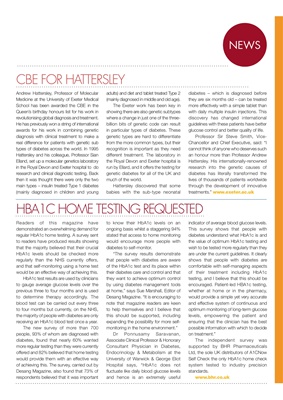
NEWS
CBE FOR HATTERSLEY
Andrew Hattersley, Professor of Molecular
Medicine at the University of Exeter Medical
School has been awarded the CBE in the
Queen's birthday honours list for his work in
revolutionising global diagnosis and treatment.
He has previously won a string of international
awards for his work in combining genetic
diagnosis with clinical treatment to make a
real difference for patients with genetic sub
types of diabetes across the world. In 1995
Hattersley and his colleague, Professor Sian
Elland, set up a molecular genetics laboratory
in the Royal Devon and Exeter hospital to do
research and clinical diagnostic testing. Back
then it was thought there were only the two
main types - insulin treated Type 1 diabetes
(mainly diagnosed in children and young
Readers of this magazine have
demonstrated an overwhelming demand for
regular HbA1c home testing. A survey sent
to readers have produced results showing
that the majority believed that their crucial
HbA1c levels should be checked more
regularly than the NHS currently offers,
and that self-monitoring using a home test
would be an effective way of achieving this.
HbA1c test results are used by clinicians
to gauge average glucose levels over the
previous three to four months and is used
to determine therapy accordingly. The
blood test can be carried out every three
to four months but currently, on the NHS,
the majority of people with diabetes are only
receiving an HbA1c blood test once a year.
The new survey of more than 700
people, 93% of whom are diagnosed with
diabetes, found that nearly 60% wanted
more regular testing than they were currently
offered and 82% believed that home testing
would provide them with an effective way
of achieving this. The survey, carried out by
Desang Magazine, also found that 73% of
respondents believed that it was important
HBA1C HOME TESTING REQUESTED
to know their HbA1c levels on an
ongoing basis whilst a staggering 94%
stated that access to home monitoring
would encourage more people with
diabetes to self-monitor.
"The survey results demonstrate
that people with diabetes are aware
of the HbA1c test and its place within
their diabetes care and control and that
they want to achieve optimum control
by using diabetes management tools
at home," says Sue Marshall, Editor of
Desang Magazine. "It is encouraging to
note that magazine readers are keen
to help themselves and I believe that
this should be supported, including
expanding the possibility for more selfmonitoring in the home environment."
Dr Ponnusamy Saravanan,
Associate Clinical Professor & Honorary
Consultant Physician in Diabetes,
Endocrinology & Metabolism at the
University of Warwick & George Eliot
Hospital says, "HbA1c does not
fluctuate like daily blood glucose levels
and hence is an extremely useful
adults) and diet and tablet treated Type 2
(mainly diagnosed in middle and old age).
The Exeter work has been key in
showing there are also genetic subtypes
where a change in just one of the threebillion bits of
genetic code can result
in particular types of diabetes. These
genetic types are hard to differentiate
from the more common types, but their
recognition is important as they need
different treatment. The laboratory in
the Royal Devon and Exeter hospital is
run by Ellard, and it offers the testing for
genetic diabetes for all of the UK and
much of the world.
Hattersley discovered that some
babies with the sub-type neonatal
diabetes - which is diagnosed before
they are six months old - can be treated
more effectively with a simple tablet than
with daily multiple insulin injections. This
discovery has changed international
guidelines with these patients have better
glucose control and better quality of life.
Professor Sir Steve Smith, ViceChancellor and Chief Executive, said: "I
cannot think of anyone who deserves such
an honour more than Professor Andrew
Hattersley. His internationally-renowned
research into the genetic causes of
diabetes has literally transformed the
lives of thousands of patients worldwide
through the development of innovative
treatments." www.exeter.ac.uk
indicator of average blood glucose levels.
This survey shows that people with
diabetes understand what HbA1c is and
the value of optimum HbA1c testing and
wish to be tested more regularly than they
are under the current guidelines. It clearly
shows that people with diabetes are
comfortable with self-managing aspects
of their treatment including HbA1c
testing, and I believe that this should be
encouraged. Patient-led HBA1c testing,
whether at home or in the pharmacy,
would provide a simple yet very accurate
and effective system of continuous and
optimum monitoring of long-term glucose
levels, empowering the patient and
ensuring that the clinician has the best
possible information with which to decide
on treatment."
The independent survey was
supported by BHR Pharmaceuticals
Ltd, the sole UK distributors of A1CNow
Self Check the only HbA1c home check
system tested to industry precision
standards. www.bhr.co.uk